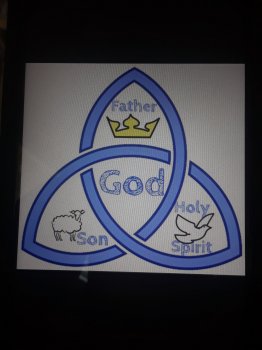In this second Part – the first Part is not yet complete, but I have been asked by a poster there to explain why I think Jesus is God – I am moving from the logical to the theological. I always intended to explain my thinking in this second Part after concluding the first Part, which focuses on overcoming a logical difficulty with Trinitarianism, but I guess they may as well proceed on parallel tracks, although one builds on the other.
By way of brief recap that I hope will pique your interest in Part One: Orthodox Trinitariaism is threatened on one side by accusations of tritheism (Father, Son and Holy Spirit are three Gods), and on the other by accusations of modalism (Father, Son and Holy Spirit are mere modes of the same single entity) – and while always striving to bend to neither, a bend away from one is often a bend toward the other. Thus, emphasizing the distinctiveness of Father, Son and Holy Spirit in fending off modalist challenges seems to be a nod toward tritheism; and vice versa.
My thesis in Part One was – is – that standing the middle ground requires distinguishing “is the same deity as” from “is the same person as,” i.e., maintaining that these two descriptive relations are not equivalent characterizations. Stated another way, defense of a tripersonal God (I prefer “triune” God, but we can use the adjectives interchangeably for now) requires two context-dependent definitions of “God” – one defining “God” as the Trinity itself, another defining “God” as a single divine person of that Trinity.
Isolating the “stuff” of “Godness” may be impossible to express in human terms, but we don’t need to do so; we only need to hold that whatever that ousia may be, it subsists in each of the three “Persons” within the Trinity. It may help to use a musical analogy here, one I am indebted to Jeremy Begbie for. Think of a chord composed of three different notes, say the chord C major composed of the notes C, E and G. Each note is a sound, and when played together the C chord is likewise a sound. In each case the sound is recognizable as what we call “music.” By analogy of “deity” to “music,” each of the three persons, like each note of the chord, is deity (music), and together they form deity (music) through three distinct sounds (persons). But the real harmony is in the Trinity (chord). Played simultaneously, the individual notes comprising the chord are subsumed in a single identifiable sound; our ear does not immediately pick the chord apart (although we can do so intellectually, and on the sheet music). It’s just music to the ear. It’s just God.
With that background, why do I think the Trinity properly describes the Godhead? (I’ve never liked that word “Godhead” much; it vaguely reminds me of a three-headed Hydra!). To start, let me do it by re-telling a story . . .
By way of brief recap that I hope will pique your interest in Part One: Orthodox Trinitariaism is threatened on one side by accusations of tritheism (Father, Son and Holy Spirit are three Gods), and on the other by accusations of modalism (Father, Son and Holy Spirit are mere modes of the same single entity) – and while always striving to bend to neither, a bend away from one is often a bend toward the other. Thus, emphasizing the distinctiveness of Father, Son and Holy Spirit in fending off modalist challenges seems to be a nod toward tritheism; and vice versa.
My thesis in Part One was – is – that standing the middle ground requires distinguishing “is the same deity as” from “is the same person as,” i.e., maintaining that these two descriptive relations are not equivalent characterizations. Stated another way, defense of a tripersonal God (I prefer “triune” God, but we can use the adjectives interchangeably for now) requires two context-dependent definitions of “God” – one defining “God” as the Trinity itself, another defining “God” as a single divine person of that Trinity.
Isolating the “stuff” of “Godness” may be impossible to express in human terms, but we don’t need to do so; we only need to hold that whatever that ousia may be, it subsists in each of the three “Persons” within the Trinity. It may help to use a musical analogy here, one I am indebted to Jeremy Begbie for. Think of a chord composed of three different notes, say the chord C major composed of the notes C, E and G. Each note is a sound, and when played together the C chord is likewise a sound. In each case the sound is recognizable as what we call “music.” By analogy of “deity” to “music,” each of the three persons, like each note of the chord, is deity (music), and together they form deity (music) through three distinct sounds (persons). But the real harmony is in the Trinity (chord). Played simultaneously, the individual notes comprising the chord are subsumed in a single identifiable sound; our ear does not immediately pick the chord apart (although we can do so intellectually, and on the sheet music). It’s just music to the ear. It’s just God.
With that background, why do I think the Trinity properly describes the Godhead? (I’ve never liked that word “Godhead” much; it vaguely reminds me of a three-headed Hydra!). To start, let me do it by re-telling a story . . .


